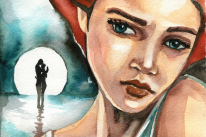
This month we’re celebrating the upcoming launch of Tiny Buddha’s Guide to Loving Yourself, a book about taming your inner critic that features 40 stories from Tiny Buddha contributors.
Throughout September, you’ll have a chance to meet some of them through daily interviews here on the blog.
Today’s featured contributor is Alexandra Heather Foss. A freelance writer who has overcome countless difficulties—from childhood trauma to health issues—she values both her tears and smiles, because both have made her who she is.
In her contribution for the book, she shares why she sees beauty in her scars, and how we can learn to value ourselves not in spite of our pain, but because of it.
A little more about Alexandra…
1. Tell us a little about yourself and your self-love journey.
Perhaps not during early childhood but certainly for the majority of my life self-love has been one of my greatest struggles. Lists full of flaws and insecurities about myself, these are easy to fill, but to have reverence for who I am is a challenge.
I get there sometimes and then I regress, and this cycle continues season after season. That said, I would not choose another path, not even if it were easier, for I own my journey.
It is the cycles up and down that have taught me about balance, beauty, even breath. When I breathe in, I see an artist, someone who loves the luscious curves of letters and the words they form. I see a creative spark that is untamed by the most torturous traumas, I see potential, excitement, lyricism, adventure.
I am someone who has never given up on myself. I am my most loyal companion, a plucky island lover who smiles up at the moon and washes away persistent tears with seawater.
These are my soul trophies, the shining glories that make me believe I am as worthy of love as any other, especially from myself. And I am grateful for the perilous moments when self-love has been absent, for the lack afforded me contrast, the ability to see that I am as beautiful as I can at times be ugly.
2. Have you ever felt there’s “something wrong with you”? If so, why, and what’s helped you change your perception?
Of course I have, for most my life actually. I think because of the traumas I have known, I adopted at a very early age the false belief that I must have deserved pain on some fundamental level, that there was something fundamentally wrong with me.
I felt corrupted and I could not believe that it was the sole result of abuse. That seemed like a convenient excuse for something deeper, but therein was the lie. I can tend to wrong just like I can tend to right, as is true for us all I believe, but I am not wrong just for being alive.
My perception has changed simply because I have devoted myself to self-work. I spend time—in the tub, at the market, when I am writing, sleeping, talking, traveling—trying to better understand my motivations and quite simply the puzzle that is me.
The larger goal was to understand others, or at least that is what started me down this journey, probably around the time I knew first real pain, but now the quest is of a far more spiritual, and certainly personal nature.
With every question I ask of myself, or others ask of me, I have to go a little deeper, and the more I learn the more I know I may be wrong sometimes, but I am not wrong.
3. Have you ever thought something was a flaw only to realize that other people actually appreciate that about you? What was the “flaw”?
Yes, many times with many flaws, but what feels most relevant to this question will seem strange in that it is certainly not by definition a flaw. Over half my life I believed I was flawed because I was a woman. There was a lot of sexism where I grew up and I felt my femininity was fundamentally flawed.
It has taken a lot of work to accept the divine feminine within me, to see my emotions as strengths, to believe without doubt that I am not part of an inferior group of people, deserving of objectification and disrespect.
Through my writing especially, my readers of various genders have showed their appreciation, seeing the beauty in something I never should have believed was a flaw but sadly did, and I am so grateful.
4. What was your biggest mistake (that you’re willing to share), and what helped you forgive yourself?
In an effort to fit in during childhood I lied one night to be with the popular kids. There were these woods where kids used to hang out and I traversed them, by myself, to for once feel as if I were normal.
That night turned into one of the worst in my life. It was the night my innocence was taken from me, when my soul retracted so far inwards I thought I would never recover it, and I have been trying to forgive myself that foolish decision, the decision to abandon myself for the acceptance of others, ever since.
5. Complete this sentence: When other people don’t like me, I…
…feel insecure and vulnerable, and often I hurt myself in an effort to understand.
6. What are some areas in your life where you’ve compared yourself to other people, and what’s helped you let go of these comparisons?
I compare myself all the time to others—with looks, career decisions and achievements, with life choices. I cannot say I have yet let go of comparison, but I am most certainly working on it.
I know I would not want the life of anyone other than myself but that does not mean when I think about a celebrity I admire, or someone I once knew, I am devoid of fear, worry, or judgment.
I think comparison can be healthy, in that it can help us learn more about how we truly feel when we measure ourselves against others, noticing how we respond after trying on a certain life path, even just via daydream, but it can also be dangerous.
Whenever something threatens us to lose ourselves, we have to be especially careful. The way I redirect when I get into a toxic comparative session, whether it be on a social media site or after a fight, is to try and think about something I love about myself.
So if I feel like I am paralyzed compared to someone I consider mobile, let’s say with career, I go rollerblading, charging myself from the inside with positive energy, and I feel a little less stuck.
7. What’s one thing you would tell your younger self about looking to other people to complete you?
Good question! I would very gently shake myself out of that philosophy. So much time I wasted feeling like I am not good enough as I am, that I need, the way I need water or air, someone else to integrate all the pieces, to make me feel valuable and complete.
I may not have been born perfect, and I do love the company of others, especially those I am closest with, but I was born complete—completely me, and that is a beautiful thing.
8. Have you ever felt afraid to show people your “real” self? Why—and what’s helped you move beyond that?
Yes! All the time! Because there are all these “flaws” I see in myself, things I think others will not like if they really knew me. For instance, I can be bossy, and picky, I have lots of psychic and physical wounds that are not especially attractive, I do not laugh nearly enough, or they can be “flaws” others have expressed about me.
I had one boyfriend who hated my knees, another my feet, hundreds of people throughout the years have criticized my career path, and refusal to conform; even the fact that I am a woman has been a problem for many.
I struggle expressing my honest self because the society I have known has discouraged my honesty, it decidedly unwelcome.
Someone asks how I am, and I say “sad,” and they squirm in their seat, sloughing off some remark about the weather to change the subject, so I have had to decide whether to lie and say “fine” when I’m not, or only share the company of those who actually want to know, even if the truth is unpleasant.
It can be lonely and confusing, feeling like who I am really is not preferable to who others wish me to be, but I’ve spent too much time lying to avoid judgment. I am still working on it but I think realizing that people are going to judge one way or another helps me to accept and project more honestly my “real” self.
9. What are the top three things you personally need to do to take good of yourself, mentally and emotionally?
- Treat myself as I do my closest loved ones (have empathy for myself)
- Spend more time in silent solitude
- Honor the things I love most—travel, nature, creativity…
10. What’s something you do regularly that makes you feel proud of the difference you’re making in the world?
My writing makes me feel proud. Hearing from others the impact my words have had on them, it lifts my spirit. I can only hope this feeling continues always.
*Note: I edited this post to remove info about the pre-order promotion, which ended on October 8, 2013. You can learn more about Tiny Buddha’s Guide to Loving Yourself here.
About Lori Deschene
Lori Deschene is the founder of Tiny Buddha. She started the site after struggling with depression, bulimia, c-PTSD, and toxic shame so she could recycle her former pain into something useful and inspire others to do the same. You can find her books, including Tiny Buddha’s Gratitude Journal and Tiny Buddha’s Worry Journal, here and learn more about her eCourse, Recreate Your Life Story, if you’re ready to transform your life and become the person you want to be.
- Web |
- More Posts













 Though I run this site, it is not mine. It's ours. It's not about me. It's about us. Your stories and your wisdom are just as meaningful as mine.
Though I run this site, it is not mine. It's ours. It's not about me. It's about us. Your stories and your wisdom are just as meaningful as mine.